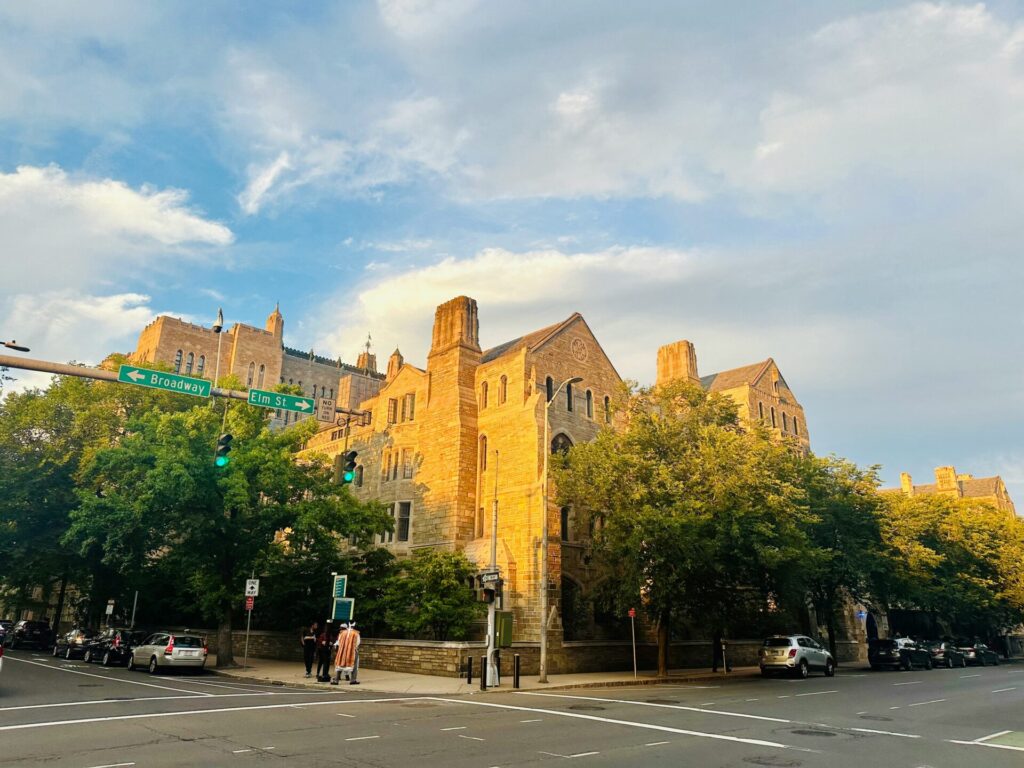University of Toronto summer programs for high school students are intensive, academically rich experiences designed to challenge and inspire global learners aged 15–18. Hosted at Canada’s top-ranked university, these three-week, English-immersion courses provide a window into Canadian academic culture while helping students refine their research, communication, and critical thinking skills.
The flagship offering is the Advanced Academic Program (AAP), where students engage in either morning or afternoon academic courses taught in a seminar-style format. The subjects taught are:
- World Economics
- Language & Literature
- Law, Ethics & Society
- Sciences Across the Spectrum
- Film & Cinema Studies
- Applied Mathematics in Statistics
Students will have 15 hours of classes per week. Each course culminates in a final independent research project and academic presentation, reinforcing learning through application.
Alongside academics, students participate in co-curricular evening workshops and weekend excursions, helping them connect socially and culturally. All participants must meet an Advanced+ English level and are expected to handle a rigorous academic workload – an ideal preparation for future university study.
Another standout is the Global Citizenship Program (GCP), which brings students together to tackle global challenges through design thinking, with a special focus on the UN Sustainable Development Goals. Past topics have included food insecurity, environmental justice, and international cooperation. Through research, guest lectures, field trips, and a group final project, students gain insight into global systems and their role within them.
These summer programmes are enrichment-focused and do not award university credit, but students do receive a certificate of completion and a personalised evaluation. For high school students ready to immerse themselves in Canadian university life, build academic skills, and connect with peers from around the world, U of T’s summer programmes offer a uniquely valuable opportunity.
Key Features of University of Toronto Summer Programs
Courses span a wide academic spectrum and are delivered in an Advanced+ English-speaking environment. The programmes blend seminar-style teaching, academic research, and project-based assessments with cultural excursions and evening enrichment activities. Students live and study on campus, experiencing a full pre-university lifestyle.
Advantages
The most striking benefit of the University of Toronto summer programs for high school students is the academic depth and structured learning environment. Students are treated like undergraduates, participating in small-group seminars and completing independent research, culminating in formal presentations – great preparation for future academic demands.
Another strength lies in the diversity of subject options. Whether a student is drawn to economics, law, film, science, or psychology, the curriculum introduces key disciplinary frameworks while keeping the learning active and engaging. Course content is grounded in real-world relevance and often tied to current global challenges.
International exposure is also central. Students learn alongside peers from a wide variety of cultural and academic backgrounds, gaining perspectives that stretch their worldview. This is especially visible in the Global Citizenship Program, where cross-cultural teamwork and global awareness are the foundation of every project.
Beyond the classroom, U of T’s downtown Toronto location enriches the experience with excursions and team-building activities that connect students to one of Canada’s most dynamic cities. Every aspect—from curriculum to campus culture—is designed to simulate and support university-level thinking.
Disadvantages
Although highly respected, U of T’s summer programmes may not suit every student. The required English proficiency is Advanced+, and the pace is intense – those without strong academic foundations or language confidence may find the workload daunting.
Additionally, these programmes are structured around traditional academic models. Students seeking hands-on internships, real-world placements, or creative open-ended projects might feel restricted by the formality of lectures, reading assignments, and essay-based assessments.
Another consideration is cost. As residential, full-service programmes hosted in central Toronto, fees can be high once tuition, accommodation, travel, and insurance are factored in. Scholarship availability is limited, potentially putting the experience out of reach for some applicants.
It’s also important to note that while students receive a certificate of completion, the courses are enrichment-based and offer no academic credit or formal qualification. Those hoping to get a head start on a degree or earn credit may need to explore other options.
Finally, availability can be an issue. Not all courses run in every session, and demand often exceeds capacity – making early application and flexibility in course choice essential.
University of Toronto vs Immerse Education Toronto Programmes
Both the University of Toronto and Immerse Education offer academically rigorous summer experiences, but they differ significantly in delivery, structure, and learner experience. Given limitations in availability, Immerse Education can be considered a valuable alternative to the university’s summer programs – especially given the fact that students still live and learn at the University of Toronto.
U of T’s programmes are formal, university-style offerings led by institutional faculty, emphasising independent research, academic presentations, and set syllabi. Courses are subject-specific and immersive, and students engage in both classroom learning and co-curricular cultural outings. The academic model is structured and formal, geared towards highly motivated students who meet an Advanced+ English proficiency level.
Immerse Education, by contrast, offers summer programmes in Toronto tailored specifically for high school students seeking more flexible and interactive learning. Courses such as Software Development & AI, Psychology and International Relations are delivered in small, Oxbridge-style seminar groups by expert tutors and mentors. The teaching style is discussion-led and dynamic, encouraging curiosity and critical thought in a more informal but equally serious academic setting.
Where U of T provides exposure to Canadian university-style learning, Immerse adds an emphasis on mentorship, personal growth, and specific subject exploration. Students take part in academic workshops, skills-building sessions, and real-world problem solving – building academic clarity and independence.
Both models offer value. U of T presents a classic university immersion; Immerse delivers a structured but personalised experience that helps students expand their academic confidence and prepare for higher study in a range of global contexts.
Are University of Toronto Summer Programs Worth It?
University of Toronto summer programs for high school students are absolutely worth considering for academically focussed individuals with strong English skills. The structured learning, small-group discussion, and final research project simulate undergraduate expectations in a way that few other summer schools do. However, the experience will be most rewarding for students who are confident working independently and thrive in a formal academic setting.
Join the Immerse Education 2025 Essay Competition
Follow the instructions to write and submit your best essay for a chance to be awarded a 100% scholarship.

University of Toronto Summer Programs Alternatives
There are several strong alternatives to U of T’s summer offerings—each providing valuable academic experiences with a slightly different tone or format.
In Canada, students can explore enrichment opportunities at McGill, UBC, and Western. These programmes vary in subject availability and format but often share U of T’s emphasis on pre-university academic development and campus immersion.
In the U.S., summer schools at Columbia, Yale, Stanford, and Cornell offer world-class academic instruction in a similarly structured model. These often come with broader scholarship options or transferable credits, depending on the course.
Students interested in building subject clarity and developing academic skills in a more personalised way may benefit from independent providers like Summer Springboard or ISSOS. These programmes combine college-style learning with leadership development and soft skills training.
Overall, whether choosing a traditional university programme or a more student-focused alternative, there are many enriching paths to explore.
Immerse Programs in the USA and Additional Great Choices
In addition to the Toronto programmes, Immerse Education provides summer programmes across North America tailored to students aged 15–18 who want to go beyond the classroom and explore their academic interests in depth.
Just like in Toronto, Boston offers subjects like medicine, business, engineering, and software development & AI. These courses are taught through small-group seminars and mentor-led workshops. The curriculum includes practical tasks, group projects, and academic skills training.
Elsewhere in the United States, Immerse runs immersive summer schools in New York and San Francisco – and these programmes have a unique industry twist. In New York, students take advantage of thriving industries with courses covering Fashion & Design, Media & Journalism and Marketing & Entertainment; in San Francisco, students dive into Silicon Valley innovation with courses in Environment & Sustainability, Entrepreneurship, and Software Development. In both cities, courses involve workplace visits – from design studios to newsrooms as well as tech campus and startup visits. All visits are hands-on, discussion-based, and encourage independent career exploration.
The Online Research Programme (ORP) is also available for students wanting to conduct guided academic research remotely, with supervision from top university tutors. A key benefit of this programme is that with the accredited Online Research Programme, students can earn 3 college credits.
This breadth allows students to find subject matches that align with their university ambitions—whether they’re drawn to law, science, humanities, or business—and to build the skills needed for future success in higher education.
Write How to Apply for University of Toronto Summer Programs
To apply for U of T summer programmes, students must complete an online application through the International Programs Office. Required materials usually include a personal statement, transcript, and proof of Advanced+ English proficiency. Some programmes may also ask for a reference letter.
Application cycles vary depending on the session (June, July, or August), but early application is recommended due to high demand and limited course availability. Students should also prepare a second-choice course in case their preferred option is full.
Admission is competitive and applicants should highlight academic readiness, enthusiasm for the subject, and readiness for an immersive, rigorous learning environment. Successful applicants receive a placement email along with further details about travel, residence, and course expectations.
Final thoughts
University of Toronto summer programs for high school students provide a highly structured, academically demanding experience. This is ideal for students ready to engage with real university content, and perhaps those who are dead-set on studying at the University of Toronto. For those looking for a flexible, mentor-led alternative with strong subject clarity and international options, Immerse Education offers a compelling and complementary path to summer learning – with the chance to stay on campus at the U o T, as well as at many other prestigious global universities. Both models build skills and confidence – it’s about choosing what works best for your learning style and future goals.































